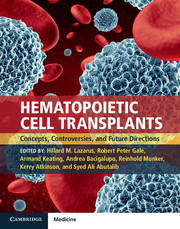Book contents
- Hematopoietic Cell TransplantsConcepts, Controversies, and Future Directions
- Hematopoietic Cell Transplants
- Copyright page
- Dedications
- Contents
- The Editors
- List of Contributors
- Preface
- Chapter 1 A Brief History of Hematopoietic Cell Transplantation
- Chapter 2 Current Use and Trends in Hematopoietic Cell Transplantation
- Chapter 3 Biology: Critical Components of Hematopoietic Cell Transplantation
- Section 1 Recipient Selection for Hematopoietic Cell Transplantation
- Section 2 Donor Selection for Allogeneic Hematopoietic Cell Transplants: A Moving Target
- Section 3 Collecting and Processing of the Graft
- Section 4 Early Post-Transplant Interval
- Section 5 Infections after Hematopoietic Cell Transplantation: Progress?
- Section 6 Late Complications of Hematopoietic Cell Transplantation
- Section 7 Other Complications of Hematopoietic Cell Transplants
- Section 8 Prevention, Detection, and Treatment of Relapse after Hematopoietic Cell Transplants
- Section 9 Selection of Conditioning Regimen and Challenges with Different Types of T-Cell Depletion Methods
- Section 10 Hematopoietic Cell Transplants for Acute Leukemia and Myelodysplastic Syndrome
- Section 11 Hematopoietic Cell Transplants for Myeloproliferative Neoplasms
- Section 12 Hematopoietic Cell Transplants for Lymphomas: Changing Indications
- Section 13 Plasma Cell Dyscrasias: Hematopoietic Cell Transplants
- Section 14 Autotransplants for Solid Neoplasms
- Section 15 Hematopoietic Cell Transplants for Non-Neoplastic Diseases
- Section 16 Novel Transplant Strategies
- Section 17 Novel Cell Therapies and Manipulations: Ready for Prime-Time?
- Chapter 62 Adoptive Cell Therapy for Cancer Using T-Cells Genetically Engineered to Express Chimeric Antigen Receptors
- Chapter 63 NK Cells for Cancers
- Chapter 64 Immune Therapy with Cytotoxic T-Lymphocytes for Treatment of Infections
- Chapter 65 Strategies to Augment Graft-versus-Leukemia and -Lymphoma Effects
- Chapter 66 Expanded Umbilical Cord Cells: Benefits and Limitations
- Chapter 67 Gene Therapy in Hematopoietic Cell Transplants
- Chapter 68 Regenerative Medicine: The Future?
- Chapter 69 Statistics: Do We Understand the Results of Our Analyses?
- Chapter 70 Pharmacologic Controversies in Hematopoietic Cell Transplants
- Chapter 71 Quality of Life: Can We Really Make a Difference?
- Chapter 72 Epilogue
- Index
- References
Chapter 68 - Regenerative Medicine: The Future?
from Section 17 - Novel Cell Therapies and Manipulations: Ready for Prime-Time?
Published online by Cambridge University Press: 24 May 2017
- Hematopoietic Cell TransplantsConcepts, Controversies, and Future Directions
- Hematopoietic Cell Transplants
- Copyright page
- Dedications
- Contents
- The Editors
- List of Contributors
- Preface
- Chapter 1 A Brief History of Hematopoietic Cell Transplantation
- Chapter 2 Current Use and Trends in Hematopoietic Cell Transplantation
- Chapter 3 Biology: Critical Components of Hematopoietic Cell Transplantation
- Section 1 Recipient Selection for Hematopoietic Cell Transplantation
- Section 2 Donor Selection for Allogeneic Hematopoietic Cell Transplants: A Moving Target
- Section 3 Collecting and Processing of the Graft
- Section 4 Early Post-Transplant Interval
- Section 5 Infections after Hematopoietic Cell Transplantation: Progress?
- Section 6 Late Complications of Hematopoietic Cell Transplantation
- Section 7 Other Complications of Hematopoietic Cell Transplants
- Section 8 Prevention, Detection, and Treatment of Relapse after Hematopoietic Cell Transplants
- Section 9 Selection of Conditioning Regimen and Challenges with Different Types of T-Cell Depletion Methods
- Section 10 Hematopoietic Cell Transplants for Acute Leukemia and Myelodysplastic Syndrome
- Section 11 Hematopoietic Cell Transplants for Myeloproliferative Neoplasms
- Section 12 Hematopoietic Cell Transplants for Lymphomas: Changing Indications
- Section 13 Plasma Cell Dyscrasias: Hematopoietic Cell Transplants
- Section 14 Autotransplants for Solid Neoplasms
- Section 15 Hematopoietic Cell Transplants for Non-Neoplastic Diseases
- Section 16 Novel Transplant Strategies
- Section 17 Novel Cell Therapies and Manipulations: Ready for Prime-Time?
- Chapter 62 Adoptive Cell Therapy for Cancer Using T-Cells Genetically Engineered to Express Chimeric Antigen Receptors
- Chapter 63 NK Cells for Cancers
- Chapter 64 Immune Therapy with Cytotoxic T-Lymphocytes for Treatment of Infections
- Chapter 65 Strategies to Augment Graft-versus-Leukemia and -Lymphoma Effects
- Chapter 66 Expanded Umbilical Cord Cells: Benefits and Limitations
- Chapter 67 Gene Therapy in Hematopoietic Cell Transplants
- Chapter 68 Regenerative Medicine: The Future?
- Chapter 69 Statistics: Do We Understand the Results of Our Analyses?
- Chapter 70 Pharmacologic Controversies in Hematopoietic Cell Transplants
- Chapter 71 Quality of Life: Can We Really Make a Difference?
- Chapter 72 Epilogue
- Index
- References
- Type
- Chapter
- Information
- Hematopoietic Cell TransplantsConcepts, Controversies and Future Directions, pp. 657 - 673Publisher: Cambridge University PressPrint publication year: 2000



